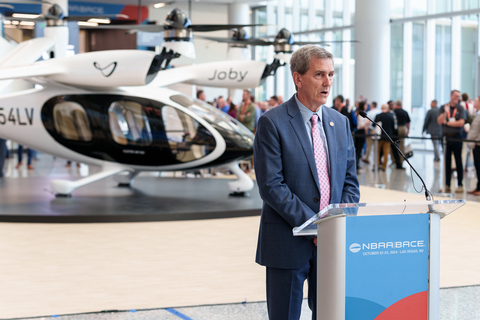Joby Welcomes Publication of New Operating Regulations by FAA

FAA Administrator Michael Whitaker signed new rules covering the pilot training and operation of air taxis at the National Business Aviation Association’s annual conference in
Published by the Federal Aviation Administration (“FAA”), the Special Federal Aviation Regulation (“SFAR”) establishes requirements for the safe and efficient integration of aircraft like Joby’s into the nation’s aviation system. In doing so, it lays the groundwork necessary for Joby to launch commercial passenger service in the
"The regulation published today will ensure the
In a press release, the FAA referred to the new rule as “the final piece of the puzzle for safely introducing these aircraft in the near term.” The FAA also stated that the rule “allows for pilots to train in powered-lift with a single set of flight controls,” consistent with Joby’s approach to preparing pilots for commercial service using high-fidelity simulators. In addition, the rulemaking includes regulations that will underpin Joby’s commercial operations, such as helicopter-based energy reserve requirements.
The 2024 FAA Reauthorization Act, signed into law in May 2024, included a mandate for the agency to prepare for the safe and efficient introduction of electric and hydrogen-electric aircraft into the National Airspace System, in part by finalizing the SFAR.
Designed to carry a pilot and four passengers at speeds of up to 200 mph, the Joby aircraft will offer high-speed mobility with a small fraction of the noise produced by helicopters and zero operating emissions.
About Joby
Joby Aviation, Inc. (NYSE:JOBY) is a
Forward Looking Statements
This press release contains “forward-looking statements” within the meaning of the “safe harbor” provisions of the Private Securities Litigation Reform Act of 1995, including but not limited to, statements regarding the development and performance of our aircraft, our regulatory outlook, progress and timing; our business plan, objectives, goals and market opportunity; our expectations related to certification and operation of our aircraft; and our current expectations relating to our business, financial condition, results of operations, prospects, capital needs and growth of our operations, including the expected benefits of our vertically-integrated business model. You can identify forward-looking statements by the fact that they do not relate strictly to historical or current facts. These statements may include words such as “anticipate”, “estimate”, “expect”, “project”, “plan”, “intend”, “believe”, “may”, “will”, “should”, “can have”, “likely” and other words and terms of similar meaning in connection with any discussion of the timing or nature of future operating or financial performance or other events. All forward looking statements are subject to risks and uncertainties that may cause actual results to differ materially, including: our ability to launch our air taxi service and the growth of the urban air mobility market generally; our ability to produce aircraft that meet our performance expectations in the volumes and on the timelines that we project; the competitive environment in which we operate; our future capital needs; our ability to adequately protect and enforce our intellectual property rights; our ability to effectively respond to evolving regulations and standards relating to our aircraft; our reliance on third-party suppliers and service partners; uncertainties related to our estimates of the size of the market for our service and future revenue opportunities; and other important factors discussed in the section titled “Risk Factors” in our Annual Report on Form 10-K, filed with the Securities and Exchange Commission (the “SEC”) on February 27, 2024, and in future filings and other reports we file with or furnish to the SEC. Any such forward-looking statements represent management’s estimates and beliefs as of the date of this release. While we may elect to update such forward-looking statements at some point in the future, we disclaim any obligation to do so, even if subsequent events cause our views to change.
View source version on businesswire.com: https://www.businesswire.com/news/home/20241022005752/en/
Joby Aviation
Investors:
investors@jobyaviation.com
Media:
press@jobyaviation.com
Source: Joby Aviation, Inc.







